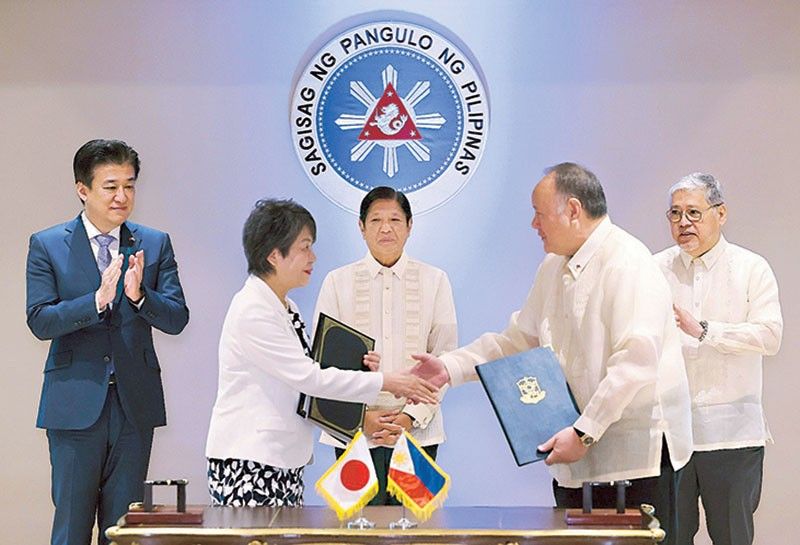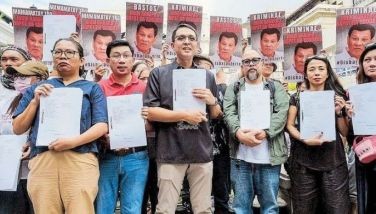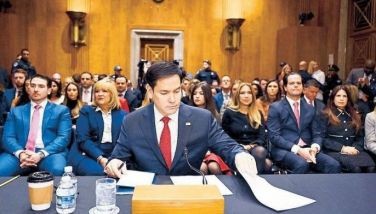Philippines, Japan ink military access agreement

MANILA, Philippines — The Philippines and Japan are deepening security and maritime cooperation including in the cyber domain following the signing of a landmark Reciprocal Access Agreement (RAA) yesterday.
The RAA was signed by Japanese Foreign Minister Yoko Kamikawa and Defense Minister Kihara Minoru with their Philippine counterparts, Foreign Secretary Enrique Manalo and Defense Secretary Gilbert Teodoro.
Witnessing the signing of the RAA at Malacañang, President Marcos said the “very, very important event” showed the fruit of what they had been “working hard to achieve.”
“Your presence here increases our confidence and the importance that the Japanese government puts on these extremely important agreements that we have,” Marcos told the Japanese officials after he witnessed the signing of treaty documents between Teodoro and Kamikawa.
The defense agreement, the first made by Japan with a Southeast Asian country, will take effect after ratification by the two countries’ legislatures. Tokyo forged similar agreements with Australia in 2022 and with Britain in 2023.
The Senate has vowed to closely scrutinize the RAA before ratification.
The RAA will facilitate procedures and set guidelines for Philippine forces’ visit to Japan for training and joint exercises, and vice versa.
For her part, Kamikawa described the RAA as a “great achievement” and a key to maintaining and strengthening a free and open Indo-Pacific region.
“The fact that we are able to sign the RAA today is a great achievement after the leaders decided to launch negotiations at last November’s summit meeting,” Kamikawa told Marcos.
“To maintain and strengthen the free and open international order based on the rule of law, we would like to strengthen our partnership under Your Excellency’s leadership,” she said.
Coastal surveillance, supply chain resilience
The Philippines is the first recipient of Japan’s newly launched Official Security Assistance (OSA).
During a working lunch with Manalo yesterday, Kamikawa said that Japan would provide a coastal surveillance radar system to the Philippines under the OSA, strengthen bilateral coast guard coordination and provide additional patrol vessels through Japan’s official development assistance.
Kamikawa and Manalo also committed to enhance the two countries’ supply chain resilience and cooperation in human resource development for the semiconductor sector.
The two countries are also strengthening cooperation in cybersecurity.
Kamikawa noted that Japan and the Philippines have made concrete progress in a wide range of areas of cooperation in the past several years.
Kihara credited Marcos and Japanese Prime Minister Fumio Kishida for the great strides in defense cooperation and exchanges the two nations have taken.
“The signature of the Reciprocal Access Agreement today represents the cooperative relationship that our two nations enjoy. And I welcome this new development, which reinforces the effectiveness of our defense cooperation,” Kihara told Marcos.
“I am committed to working with my good colleague, Secretary Teodoro, to further enhance our defense cooperation and exchanges in order to realize a free and open Indo-Pacific,” Kihara said.
“The Philippines and other Southeast Asian nations are situated in a very strategically important region, placed in a key junction of Japan’s sea-lanes. Advancing defense cooperation and exchanges with the Philippines is important for Japan,” Kihara said.
In his remarks after the signing of the RAA, Teodoro said the Philippines now looks forward to “putting into flesh, so to speak, the steps forward, now that we have upgraded our partnership one level higher by the signing of the RAA.”
“This is another milestone in our shared endeavor to ensure a rules-based international order to ensure peace and stability in the Indo-Pacific and particularly in our region,” he said.
While Philippines-Japan relations are very strong in traditional fields such as the economy and trade, “we add another dimension to our already strong bilateral relations by adding the vital aspect of security, which creates a holistic dimension or adds a holistic dimension to our bilateral relations.”
“It will also add to the multilateral efforts that both our governments are doing to make sure that our region respects the rule of international law,” he pointed out.
After meeting Marcos, Kamikawa and Kihara took part in the 2nd Foreign and Defense Ministerial Meeting (2+2) with Teodoro and Foreign Secretary Enrique Manalo in Taguig City.
The ministerial security dialogue is the highest consultative mechanism for further deepening security and defense policy coordination and security cooperation between the two countries.
The signing of the RAA between Japan and the Philippines came after Kishida and Marcos agreed in November last year to start negotiations on the pact.
Marcos had said the RAA between the Manila and Tokyo would be different from the country’s Visiting Forces Agreement (VFA) with the US.
Signed in 1998, the VFA exempts US troops from passport and visa regulations so they can participate in joint military drills in the Philippines. It’s not yet clear if Japanese soldiers would be entitled to the same privilege under the RAA.
The Philippines also has a defense pact with Australia called the Status of Visiting Forces Agreement or SOVFA, which was ratified by the Senate on July 24, 2012.
After the signing of the RAA, Kamikawa met with her counterpart Manalo.
Senate support vowed
The RAA is likely to breeze through the Senate – which needs to ratify it – with Senate President Francis Escudero voicing his full support for the agreement.
“Anything that strengthens and increases our military capability is a deterrence to a possible conflagration. I fully support this agreement/arrangement,” Escudero said.
Former Senate president Juan Miguel Zubiri lauded what he called the timely signing of the agreement.
“It was in 2022 when then-ambassador to the Philippines Koshikawa Kazuhiko and I first discussed the possibility of pursuing a Reciprocal Access Agreement between our countries, and I brought this idea to President Marcos early into his administration,” Zubiri said. “So, I welcome this signing, and I am very hopeful that it will be a key partnership for achieving peace in the region.
“Japan is already an invaluable ally, and their assistance has been vital to the modernization of our Coast Guard and Navy. With this RAA, we can further strengthen our capacity-building through joint military exercises,” he pointed out.
Sen. Joseph Victor Ejercito called the signing of the RAA “a welcome development in terms of security in the region and against China’s continued expansionism.”
“It’s important to cooperate with like-minded countries, especially our neighbors, and uphold mutual interests,” Sen. Grace Poe said.
“We welcome having stronger security ties with our neighbors in the Asia-Pacific region. However, as with other treaties, the Senate committee on foreign relations will scrutinize every line and every word of that treaty once the same is referred to us to make sure that it is aligned with the national interest of the country,” Sen. Imee Marcos said.
But for Senate Minority Leader Aquilino Pimentel III, the Philippines “should be entering more agreements of an economic nature, which would allow us to sell Philippine-made and Philippine-grown products/items to other countries.”
Groups slam RAA
The militant Bagong Alyansang Makabayan issued a statement denouncing the RAA.
“We strongly oppose the RAA,” it said, reminding the public of Japan’s militarism during World War II that it said had caused suffering to the Philippnies and other Asian countries.
Gabriela Women’s party-list Rep. Arlene Brosas called the agreement a threat to “sovereignty and regional peace.”
She said the RAA is “essentially another Visiting Forces Agreement that will allow Japanese Self-Defense Forces to participate in military exercises in the Philippines, primarily the United States-Phl Balikatan.”
“We must not forget the historical context of this agreement. Japan has yet to fully atone for its wartime atrocities, particularly the systematic abuse of comfort women,” she added. — Cecille Suerte Felipe, Pia Lee-Brago, Sheila Crisostomo, Mark Ernest Villeza
- Latest
- Trending































